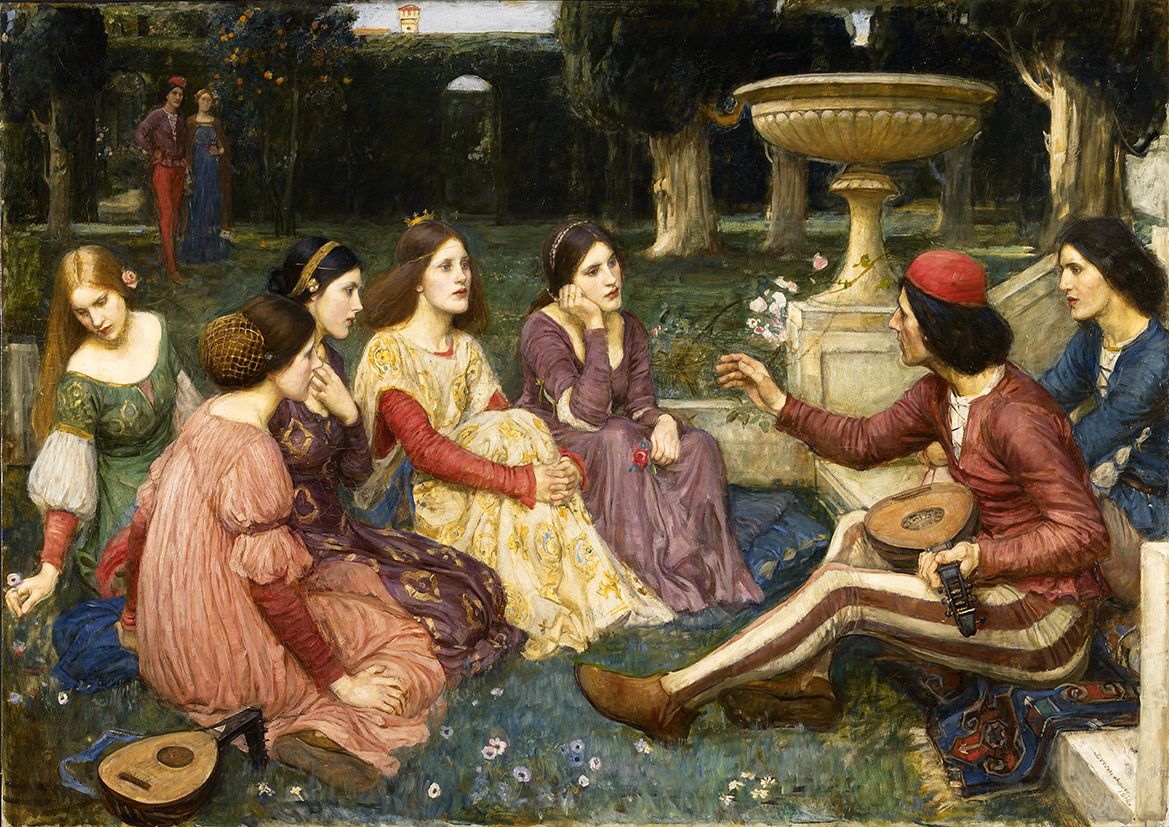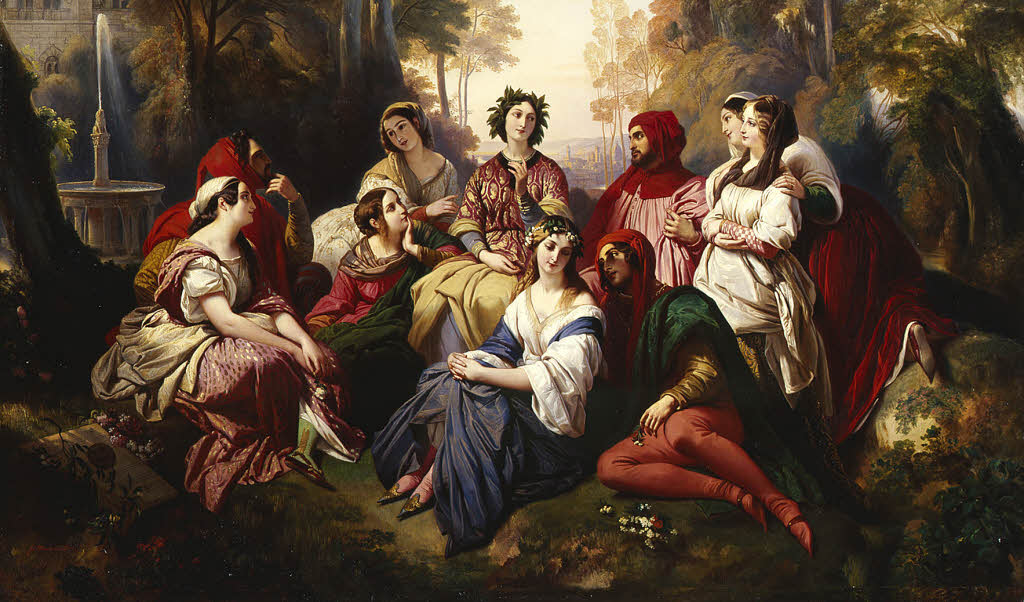Boccaccio’s Decameron is a series of tales told within a frame narrative by ten different authors over a period of ten days. In these tales, the idea of fortune being the controller of actions is visible. The differing characters’ varied experiences show they are at the whim of Fortune, whether this Fortune is a divine being or an abstraction that randomly determines one’s fate.
The author of the seventh story on day two states before her story begins “…let me affirm that no person alive can choose any one of them in complete confidence that it will remain immune from the vicissitudes of Fortune” (1809). Fortune, in this case, is the Roman goddess Fortuna often referred to in the Middle Ages whose wheel could determine the fate of an individual (1809). Throughout Decameron, the idea of Fortune as a character is prevalent in the way it actively shapes the lives of the differing characters.
First, it is important to establish exactly what, or rather who, Fortune is and its role in Decameron. Fortune is personified throughout Decameron. Rather than being an unknown entity, Fortune seems to be a player in the lives of the characters. Indeed, the characters will often refer to the hand that Fortune has dealt them. It is a choice by Fortune as to what will happen to them.
Fortune can then be described in two different ways, the first being a divine force, whether that be God or Fortuna. Secondly, it can be seen as a force that does not take a form per se but is instead an abstract force that purposefully influences the course of a person’s life.
In the story of Messer Rossiglione, his wife, and Messer Guardastagno, Fortune seems to be one of God’s tools because of the moralistic and just ending. Rossiglione’s wife sleeps and falls in love with her husband’s friend Guardastagno. When Rossiglione catches them, he kills Guardastagno, pulls out his heart, and feeds it to his wife.
Because everyone is punished for their wrongdoings, and since none of the three characters are considered good people, this story has a more moralistic ending. The cheating wife is tricked into eating her lover’s heart and kills herself because of it, the man she is cheating with is killed by her husband, and the husband is plagued by guilt and fear, causing him to run away and forsake his castle and many vassals. In the case of this story, it sounds like God is dealing out punishments to those who deserve them, making fortune a divine instrument of his will.

The Roman goddess Fortuna, however, is not so moralistic. In order to determine one’s fate, she spins her Wheel of Fortune, and whatever it lands on it what happens to the characters. Princess Alatiel is one such character who seems to have gotten many unlucky sins. Unlike the characters from the first story, it is no sin or mistake by Alatiel to cause her to endure such hardships.
Fortuna decides how her life plays out rather than her actions dictating what happens to her. She does not deserve to be captured and handed off to man after man, yet it still happens. In fact, there seems to be no concept of deserving or undeserving. Fortuna does not care what is right or wrong and is far more spontaneous.
Since fortune’s role in Alatiel’s life is so random, she is lucky that she received a happy ending. Often, Alatiel realizes that she is lucky in the hand that Fortuna dealt her because she often falls in love with her captors. She knows that Fortuna’s wheel could have landed on something far worse than a handsome prince, a duke, or a rich man capturing and falling in love with her.
While her experiences were by no means good, they could have been far worse. By the end of her story, she is happily married, so Fortuna gave her a happy ending after all of the torment she was put through.
Unlike Alatiel, Ciappelletto is an extremely immoral individual who deserves to be punished. He is a liar, a murder, and a man of ill repute. Despite his evil life, however, he is allowed to deceive a friar into abolishing him of sins and is remembered by all as a saint. In Ciappelletto’s case, fortune takes on a more abstract form. Humans cannot control what Fortune chooses to do.
They can, according to Vincenzo Cioffari, influence it to some degree by taking advantage of the fortuitous events in their lives (The Conception of Fortune 130). Fortune creates the situation for Ciappelletto to succeed in being abolished of his sins, but it does not necessarily force this outcome to occur. With this type of Fortune, one is not completely helpless to the whims of Fortune but must possess much cunning to seize the small pieces of success that Fortunes gives and grow them further.

It is odd how Boccaccio gives Fortune seemingly contradictory roles. What Boccaccio is actually doing, according to Cioffari, is reconciling the artistic idea of Fortune as a goddess and God’s control over the lives of humanity (The Function of Fortune 3). Boccaccio is playing with the different ideas of Fortune that have occurred throughout history, the goddess Fortune and her wheel and God being the administrator of Fortune.
He is able to do so because each of the three stories referenced is told by different authors of the frame narrative, so they will each use fortune differently. By using the frame narrative, Boccaccio is able to use different perspectives and ideas of who Fortune is to tell his stories.
The evidence throughout Decameron makes it clear that no one is “immune to the vicissitudes of Fortune” (1809). Whether it is a divine being or an abstract force, it dictates the events in a person’s life, and no one is free from its influences. The tales of Decameron show Fortune to be an active player in the character’s lives where it takes on many different roles.
Boccaccio also uses a frame narrative with ten different authors in order to utilize the different aspects of Fortune’s character. Despite the fluctuations in Fortune’s character, however, the people in each of the stories are still bound to the decisions of Fortune, and can rarely do anything to change that.
Works Cited
Cioffari, Vincenzo. “The Conception of Fortune in the Decameron”. Italica 17.4 (1940): 129–137. JSTOR Journals. Web. 30 Oct. 2015.
Cioffari, Vincenzo. “The Function of Fortune in Dante, Boccaccio and Machiavelli”. Italica (1947): 1-13. 24.1 JSTOR Journals. Web. 30 Oct. 2015.
